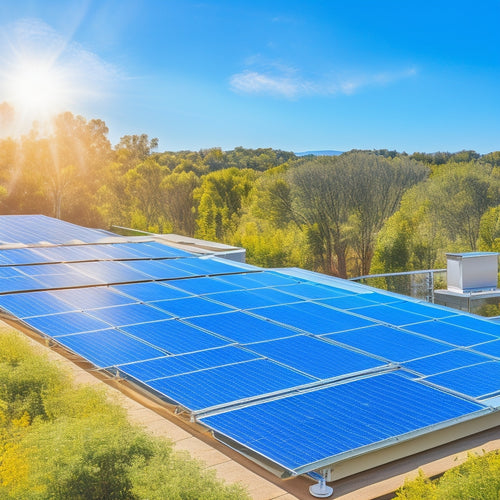
Home Solar Battery Storage
Share
You're considering home solar battery storage to utilize the power of the sun and break free from reliance on the grid, releasing a cleaner, more sustainable, and cost-effective energy future. By storing excess energy generated during the day, you'll have power at night, reducing your electricity bills and enhancing energy independence. With the right deep cycle battery technology and inverter compatibility, you'll maximize your system's performance and efficiency. Understanding battery depth of discharge and proper maintenance will extend battery lifespan, and advanced battery tech is making solar storage more accessible. As you investigate the benefits of home solar battery storage, you'll uncover even more ways to optimize your system for a brighter energy future.
The Essentials
- Home solar battery storage enables energy independence and security by storing excess energy for nighttime use and providing backup power during grid outages.
- Lithium-ion batteries are preferred for their high efficiency and longevity, with a lifespan of 5-20 years, and require proper maintenance for optimal performance.
- Inverter compatibility is crucial, with high-efficiency inverters (>95%) and reliable brands ensuring optimal system performance and dependability.
- Advanced battery technology and smart integration improve performance, energy efficiency, and convenience, with decreasing costs making solar battery storage more accessible.
- Home solar battery systems significantly lower energy costs by storing excess energy and reducing grid power consumption, with financial incentives available to offset upfront costs.
Energy Independence at Night
You're no longer limited to generating power only during the day with solar panels.
With home solar battery storage, you can enjoy nighttime energy security, using the excess energy you've stored during the day to power your home after sunset.
By integrating a reliable Renewable Energy solution, you can maximize your solar panel investment and reduce your reliance on the grid.
This means you'll have power when you need it most, even when the grid goes down.
Nighttime Energy Security
At night, when the sun is no longer generating electricity, homeowners with solar panels often rely on the grid to power their homes. This reliance on the grid reduces your energy independence and increases your reliance on external energy sources.
However, with home solar battery storage, you can enjoy nighttime energy security and maintain your energy independence. By switching to a home solar power battery, you'll enjoy reduced energy expenses, uninterrupted power supply, and the freedom to be less reliant on the grid, providing a cleaner, more sustainable, and self-sufficient lifestyle off-grid solar batteries for you and your family.
By storing excess energy generated during the day, you can power your home at night using your own clean energy. This energy storage solution guarantees that you're not dependent on the grid when the sun goes down.
With a solar battery storage system, you can optimize your solar efficiency by storing excess energy during peak sunlight hours and using it when you need it most.
Power After Sunset
With nighttime energy security assured, your focus shifts to maximizing power after sunset. You want to utilize the full potential of your solar energy system to power your home during the evening hours. This is where your battery storage system comes into play. By storing excess solar energy generated during the day, you can draw on it when the sun goes down.
| Battery Type | Capacity (kWh) | Efficiency (%) |
|---|---|---|
| Lead-Acid | 4.5 | 85 |
| Lithium-Ion | 13.5 | 95 |
| Flow Battery | 10 | 80 |
When selecting a battery, consider factors like capacity, efficiency, and cost. A higher-capacity battery will provide more power after sunset, while a more efficient battery will lose less energy during charging and discharging. Lithium-ion batteries, for instance, offer high efficiency and long lifetimes, making them a popular choice for home solar battery storage systems. By choosing the right battery for your needs, you can enjoy a reliable and efficient source of power after sunset, reducing your reliance on the grid and taking a step towards true energy independence.
Reduced Electricity Bill Size
When you install a home solar battery storage system, you can greatly lower your energy costs by storing excess energy generated during the day for use at night.
This means you'll be drawing less power from the grid, resulting in smaller bill amounts.
With a residential energy storage system, you can maximize your energy independence and reduce your reliance on the grid.
Lower Energy Costs
About 80% of your electricity bill is typically comprised of the energy you consume during peak hours.
By storing excess energy generated by your solar panels in a home solar battery, you can reduce your reliance on the grid during these peak periods, leading to lower energy costs.
This is especially beneficial in regions with time-of-use (TOU) pricing, where electricity rates vary depending on the time of day.
Smaller Bill Amount
By reducing your reliance on the grid during peak hours, you'll also see a considerable impact on your electricity bill size.
With a home solar battery storage system, you can store excess energy generated by your solar panels during the day and use it to power your home at night or during periods of high energy demand. This reduces your consumption of grid electricity, which typically costs more during peak hours.
As a result, you'll enjoy cost savings on your electricity bill. The amount you save will depend on your energy usage patterns, the size of your solar panel system, and the capacity of your battery storage system. However, with the right system, you can considerably reduce your reliance on the grid and lower your electricity bill.
In addition to cost savings, you may also be eligible for financial incentives, such as rebates or tax credits, for installing a home solar battery storage system.
These incentives can help offset the upfront cost of the system, making it more affordable and increasing your return on investment. By reducing your electricity bill size, you'll enjoy greater energy independence and more money in your pocket.
Deep Cycle Battery Technology
You're likely familiar with the significance of choosing the right deep cycle battery for your home solar battery storage system, which is an essential component of a residential solar battery system.
When it comes to home energy independence, selecting the right battery can make all the difference.
When selecting a deep cycle battery, you'll want to take into account its cycle life expectancy, which refers to the number of charge and discharge cycles it can handle before its capacity degrades.
Additionally, you'll need to understand battery depth grading, which indicates how deeply a battery can be safely discharged without damaging its cells.
Cycle Life Expectancy
A deep cycle battery's lifespan is measured by its cycle life expectancy, which refers to the number of charge and discharge cycles it can handle before its capacity degrades to a certain level.
As you consider investing in home solar battery storage, it's crucial to comprehend this critical aspect of deep cycle battery technology. You'll want to know how many cycles your battery can withstand to guarantee you get the most out of your solar energy system.
A higher cycle life expectancy means your battery will last longer and provide more efficient solar energy storage.
To maximize your battery's lifespan, follow proper battery maintenance tips, such as avoiding extreme temperatures, keeping the battery clean, and monitoring its state of charge. By doing so, you'll be able to enjoy the benefits of solar energy efficiency for years to come.
Typically, a deep cycle battery can last for around 5-15 years, with some high-quality batteries reaching up to 20 years or more.
Battery Depth Grading
As your deep cycle battery's lifespan is directly tied to its cycle life expectancy, understanding how its capacity is graded is essential to maximizing its performance. This is where battery depth grading comes in – a critical aspect of deep cycle battery technology.
Depth grading refers to the percentage of the battery's capacity that's used during each charging cycle. You see, a deep cycle battery's capacity isn't fixed; it's designed to provide a certain amount of energy over its lifespan. The deeper you discharge the battery, the fewer charging cycles it'll last.
Battery manufacturers use depth grading to specify the recommended depth of discharge (DOD) for their products. A higher DOD means more energy is extracted from the battery, but it also reduces the number of charging cycles it can handle.
For instance, a battery with an 80% DOD will provide more energy per cycle, but it'll last for fewer cycles than one with a 50% DOD. Understanding battery depth grading helps you optimize your battery's performance, ensuring you get the most out of your investment and maximize its battery efficiency.
Check Your Inverter Compatibility
When selecting a home solar battery storage system, you'll need to verify your inverter is compatible with your chosen battery technology.
The type of inverter you have matters, as some are designed to work with specific battery chemistries or configurations.
Additionally, it's crucial to evaluate the overall energy management system, including renewable energy storage solutions, to maximize your energy savings.
You'll want to check your system configuration to guarantee a seamless integration between your inverter and battery storage system.
Inverter Type Matters
You're about to connect your solar panels to a battery storage system, but hold on - inverter type matters. The inverter is the heart of your solar power system, converting DC power from your panels to AC power for your home. Not all inverters are created equal, and choosing the right one can greatly impact your system's performance.
When selecting an inverter, consider inverter efficiency, which affects how much energy is wasted as heat. Look for high-efficiency inverters (above 95%) to maximize your energy harvest.
Inverter reliability is also vital, as a faulty inverter can bring your entire system down. Research inverter brands with a proven track record of reliability and low failure rates.
Proper inverter installation and maintenance are also important to guarantee peak performance and extend the inverter lifespan (typically 10-15 years). Some inverters offer easier maintenance and upgrades, so consider these factors when making your decision.
System Configuration Checks
Now that you've selected the right inverter, it's time to verify it's compatible with your system configuration.
You'll want to confirm the inverter can handle the voltage and current output of your solar panels. Check the inverter's maximum power point tracking (MPPT) range to ascertain it matches your panel's voltage output. Also, verify the inverter's maximum current rating can handle the current output of your panels.
Next, review the installation guidelines for your inverter and battery bank. Confirm the inverter is installed in a well-ventilated area, away from direct sunlight and moisture.
Follow the manufacturer's recommended wiring and electrical connections to guarantee safe and efficient operation. Proper installation is essential for system maintenance and longevity.
Longer Cycle Life Guaranteed
When you opt for a home solar battery storage system, you want to make certain it lasts for a long time.
Advanced battery technology guarantees a longer cycle life, which means you'll get more charge-discharge cycles before the battery's capacity starts to degrade.
This results in a lower cost per kWh over the battery's lifespan, making your investment more cost-effective.
Advanced Battery Technology
Reliability is the cornerstone of any home solar battery storage system, and advanced battery technology has been instrumental in achieving this feat. You're looking for a system that can store excess energy generated by your solar panels during the day and release it when needed. Advanced battery technology guarantees that your energy storage system can perform at its best, providing you with a dependable source of power.
With advanced battery technology, you can expect improved battery performance, energy efficiency, and increased storage capacity. This means you'll have more power available when you need it, reducing your reliance on the grid.
Smart technology integration enables seamless solar integration, allowing your system to automatically switch between solar power and battery storage. Plus, advanced battery technology reduces the environmental impact of your energy storage system, making it a more sustainable choice.
When evaluating advanced battery technology, consider factors like charging speed, maintenance requirements, and cost analysis. Market trends suggest that advanced battery technology will continue to drive down costs, making home solar battery storage more accessible to you.
Frequently Asked Questions
Can I Use My Solar Battery Storage System During a Grid Outage?
When the grid goes down, you'll want a reliable backup plan; with a solar battery storage system, you can achieve off-grid living and energy independence, ensuring you're not left in the dark, and you're free to power your life on your terms.
How Do I Maintain and Clean My Solar Battery Storage System?
As you venture into the world of energy independence, you're likely wondering how to keep your system running at its best. To maximize battery lifespan, you'll want to follow essential maintenance tips: check electrolyte levels, guarantee proper ventilation, and monitor system performance regularly to prevent issues.
Are Solar Battery Storage Systems Compatible With All Roofing Types?
When installing solar panels, you'll find that not all roofing materials are created equal; you'll need to take into account installation compatibility, as some materials like asphalt shingles or clay tiles may require specialized mounting systems or extra precautions.
Can I Monitor My Solar Battery Storage System Remotely?
You can track your energy independence with ease - 70% of solar owners want remote monitoring. Yes, you can monitor your solar battery storage system remotely, getting real-time observations into battery performance and optimizing your energy usage for maximum freedom.
Are There Any Government Incentives for Solar Battery Storage Systems?
You're eligible for federal tax credits and local rebates when investing in renewable energy systems; these incentives can greatly reduce your upfront costs, giving you more freedom to choose sustainable solutions that align with your values.
Final Thoughts
As you consider home solar battery storage, it's no coincidence that energy independence and reduced electricity bills align with your values. By choosing a deep cycle battery with a compatible inverter, you're guaranteed a longer cycle life. It's not just a smart investment, it's a step towards a sustainable future. Coincidence or not, your decision to switch to solar battery storage will pay off - literally.
Related Posts
-

Top Eco-Friendly Camping Equipment for a Sustainable Adventure
When you're camping with the planet in mind, opt for eco-friendly gear like tents made from recycled materials and bi...
-

What Types of Solar Energy Devices Are Available
You'll find several types of solar energy devices available today, each customized to different energy needs. Photovo...
-

Essential Hiking Lights for Safety and Fun
When you're hitting the trails, essential hiking lights are vital for safety and fun. A lightweight headlamp offers h...


